SEO for Lawyers: Introduction
SEO for lawyers is not just about keywords or backlinks; it’s about establishing your firm as the go-to authority in your area of practice.
It’s about aligning your online presence with the needs and intentions of your target audience, ensuring that when they seek legal guidance, it’s your expertise they encounter first.
-
Key Takeaways
- Technical SEO, content creation, and backlinks are foundational for establishing a strong online presence and ensuring your website is both visible and authoritative.
- Local SEO is vital for law firms to appear in the Google Map Pack, directly targeting potential clients in their area and boosting local visibility.
- On-page optimisation, including title tags and meta descriptions, and off-page strategies like acquiring high-quality backlinks, are essential for building website authority.
- Continuous adaptation to search engine algorithm changes is necessary to maintain visibility and competitiveness in search rankings.
- Utilising SEO tools such as Google Search Console, SEMRush, and Ahrefs can provide valuable insights into performance and help refine strategies for better outcomes.
But why invest in law firm SEO?
Because the landscape of legal services is evolving, and with over 9,000 law firms in England and Wales alone, standing out requires more than just traditional marketing. It requires a strategic, informed approach that leverages intent-based marketing strategy to drive qualified traffic, generate leads and new clients for your firm.
Whether you’re taking your first steps into legal SEO or looking to elevate an existing law firm marketing strategy, this comprehensive SEO for lawyers guide will help bring clarity and help drive success for your law firm.
From understanding the mechanics of Google’s algorithms to implementing actionable strategies that increase your website’s visibility, this is your one essential resource for everything related to SEO for law firms.
We’ll focus mainly on Google for this SEO for lawyers article since it has the largest search volume of any search engine. So, let’s start by addressing the elephant in the room….
What is SEO for law firms?
Today, most people start looking for legal help with a simple online search. By implementing SEO strategies, law firms can attract more traffic to their website and ultimately generate more leads. This means that when potential clients search for legal services, your firm is more likely to appear in the results.
The SEO process includes improving technical aspects, creating content, and building links to increase your domain’s authority. The goal is simple – increase online visibility, drive more traffic, and ultimately, convert the traffic into leads.
The blueprint for a robust SEO strategy encompasses three fundamental elements: technical setup, content, and links. Each component plays a crucial role in ensuring your law firm’s website ranks favourably on search engines like Google (more on this later!). And if you’re in need of assistance, contact our law firm SEO agency today for a free audit.
Does SEO for solicitors still work in 2025?
The question of whether SEO for lawyers remains a viable strategy in 2025 is one that many businesses grapple with.
With a staggering 68% of online experiences beginning with a search engine, as highlighted by BridgeEdge, the relevance of SEO in today’s digital marketing landscape is not just alive; it’s thriving.
This statistic not only underlines the sustained relevance of search engines as the primary gateway to the internet but also reinforces the critical role that SEO plays in generating both prospects and new customers for law firms.
Moreover, the competitive edge provided by effective law firm SEO strategies is more crucial than ever, especially when considering that only 0.63% of searchers venture beyond the first page of Google’s search results.
Furthermore, as reported by Backlinko, the number 1 position on Google has a CTR of 27.6%!
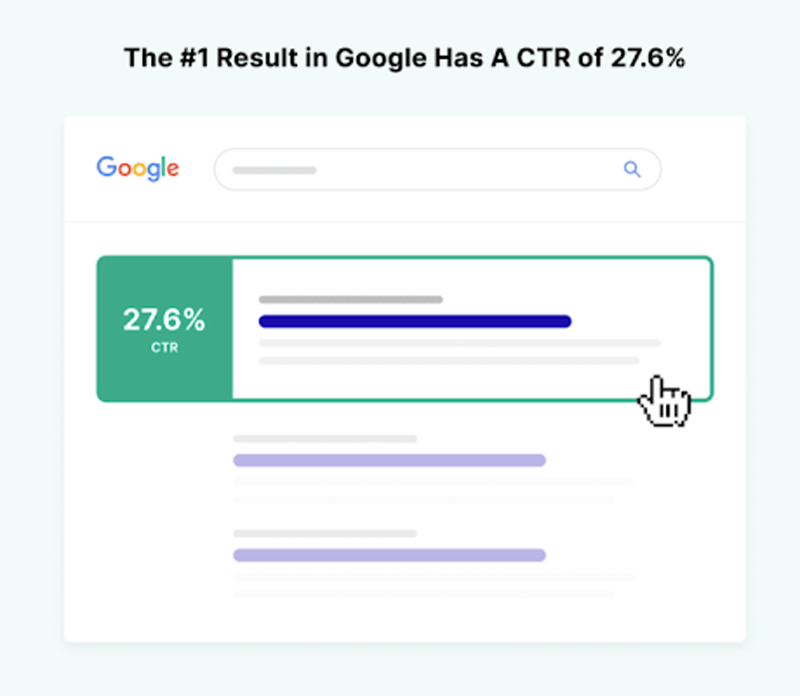
This stark figure highlights the cutthroat nature of online visibility, where securing a spot on the first page can significantly dictate a business’s success or obscurity. For law firms operating in a rapidly expanding industry, this underscores the imperative of adopting effective legal SEO strategies to not only climb but also maintain 1st page rankings in search results.
As we navigate through 2025, the effectiveness of law firm SEO is not diminishing; rather, it’s becoming more sophisticated and integral to a comprehensive digital marketing strategy. The key to harnessing the power of SEO lies in understanding its dynamic nature – adapting to algorithm changes, leveraging high-quality content, and building a robust backlink profile.
These strategies are proven to amplify a law firms website’s visibility, drawing in targeted organic traffic that is crucial for growth. With the right approach, SEO for solicitors continues to serve as a cornerstone for digital success, proving its worth as an indispensable tool for law firms aiming to thrive in the digital age.
A brief timeline of Search Engine History
Search engine optimisation (SEO) has been pivotal in shaping the internet as we know it today. From the inception of rudimentary search platforms in the mid-90s to the sophisticated algorithms of the current era, the journey of search engines is a fascinating story of innovation and adaptation
In the early days, platforms like AltaVista, Excite, and Yahoo were the gatekeepers to the internet, guiding users through a maze of websites with varying degrees of relevance.
It wasn’t until 1998, with the introduction of Google and its revolutionary PageRank algorithm, that the foundation was laid for the modern search experience. This algorithm considered both the quantity and quality of external links to a page, fundamentally changing how results were ranked.
The evolution didn’t stop there; the early 2000s saw Google introducing game-changing algorithm updates, such as Panda and Penguin, designed to prioritise high-quality content and penalise manipulative SEO tactics.
The landscape of search continued to evolve with the introduction of Google’s Knowledge Graph in 2012, which aimed to understand the semantics and intent behind user queries. As mobile technology became more prominent, Google shifted towards mobile-first indexing in 2019, recognising the primary mode of internet access for most users.
Key Timeline of Events
- 1994: Yahoo is created, serving as an Internet bookmark list and directory.
- 1996: Google’s founders develop Backrub, a precursor to Google that assesses site relevance through inbound links.
- 1997: The term “search engine optimization” is officially coined, marking the beginning of SEO as a field.
- 2000: A partnership with Yahoo catapults Google into the spotlight, setting the stage for its dominance.
- 2004: Google goes public with its IPO, and launches transformative services like Google Maps and Gmail.
- 2011: The Panda and Penguin updates are released, targeting low-quality content and unethical SEO practices.
- 2015: For the first time, mobile searches surpass desktop searches on Google, highlighting the shift towards mobile internet use.
- 2019: Introduction of BERT, enhancing natural language understanding, alongside the rollout of mobile-first indexing.
- 2020: Core updates focus on penalising thin content and improving local search results, continuing the trend towards quality and relevance.
How do search engines work for law firm SEO?
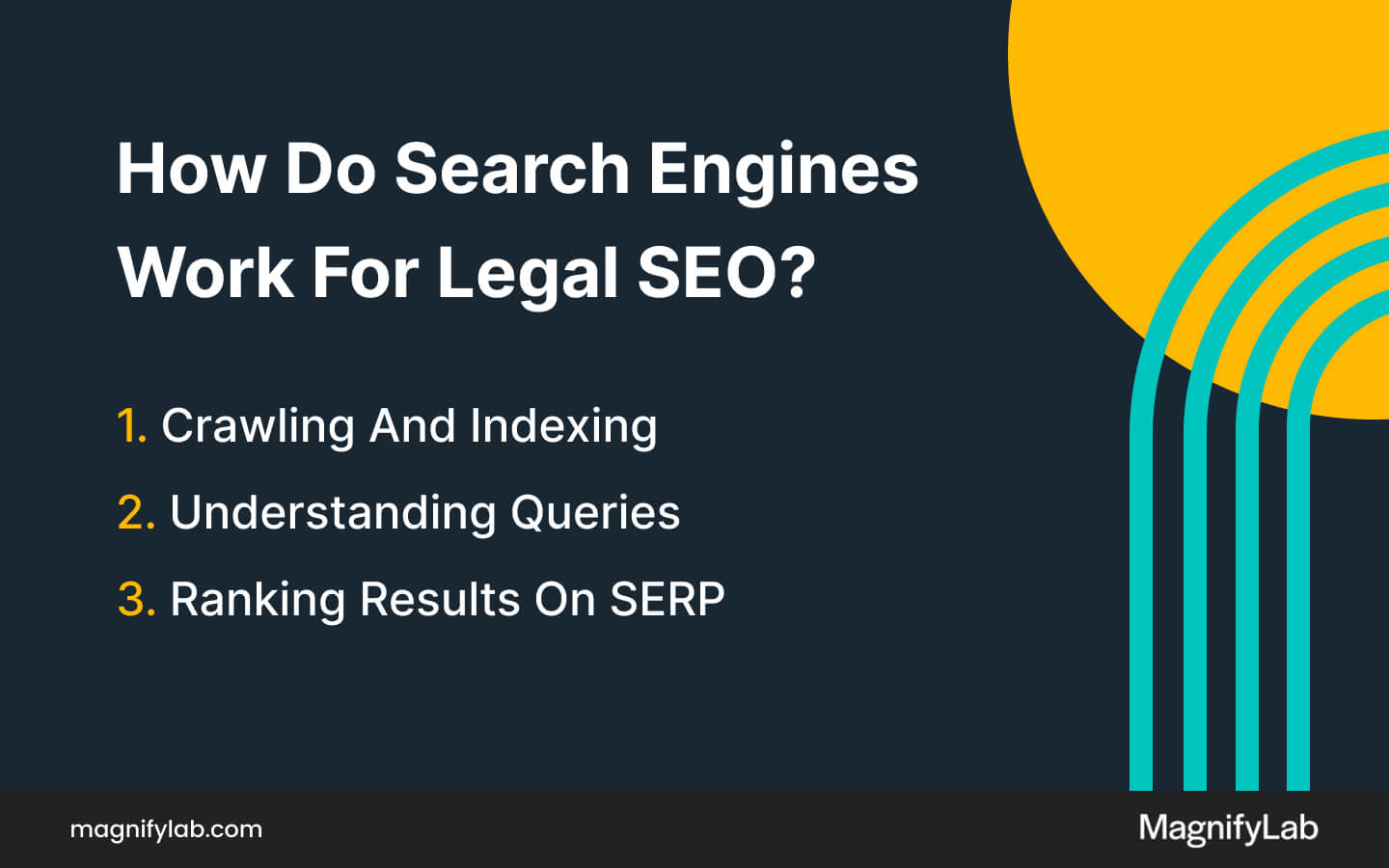
At their core, search engines aim to provide users with the most relevant, authoritative, and trustworthy information based on their search queries. This objective aligns perfectly with the principles of legal SEO, where showcasing expertise, authoritativeness, and trustworthiness (E-A-T) is paramount.
- Crawling and Indexing: Search engines use bots to crawl billions of web pages by following links from known pages to new ones, gathering data which they then index, or store, in a vast database.
- Understanding Queries: Once a user inputs a query, search engines strive to understand the intent behind it, whether it’s seeking information, looking to hire a lawyer, or researching a specific legal issue.
- Ranking Results: Based on the indexed information, search engines rank pages by relevance to the user’s query, taking into account factors like page content quality, user experience signals, and external links.
For legal websites, demonstrating E-A-T through high-quality, informative content, secure and user-friendly website design, and reputable backlinks is essential for achieving high rankings.
The importance of SEO for lawyers
Starting with a brief refresher on SEO for law firms. SEO encompasses all efforts to boost your brand’s visibility on search engine results pages (SERPs). The ultimate goal is to elevate your service pages, blog content, and informational pages to top positions on these pages to drive more traffic for your law firm.
Various factors influence the ranking of each page. Google, the leading search engine, employs an AI-powered algorithm for ranking online content. Key factors considered by the algorithm include:
- User Engagement: How visitors interact with your pages, their time spent on your site, engagement with your content, and page views.
- Link Profile: The quantity and quality of links to and from your content, including external and internal links.
- Content Quality: Relevance and usefulness of onsite material, focusing on keywords and content quality.
- Domain Authority: Relevance of content to your industry, emphasising Expertise, Authoritativeness, and Trustworthiness (E-A-T).
How does Google know how to rank a webpage?
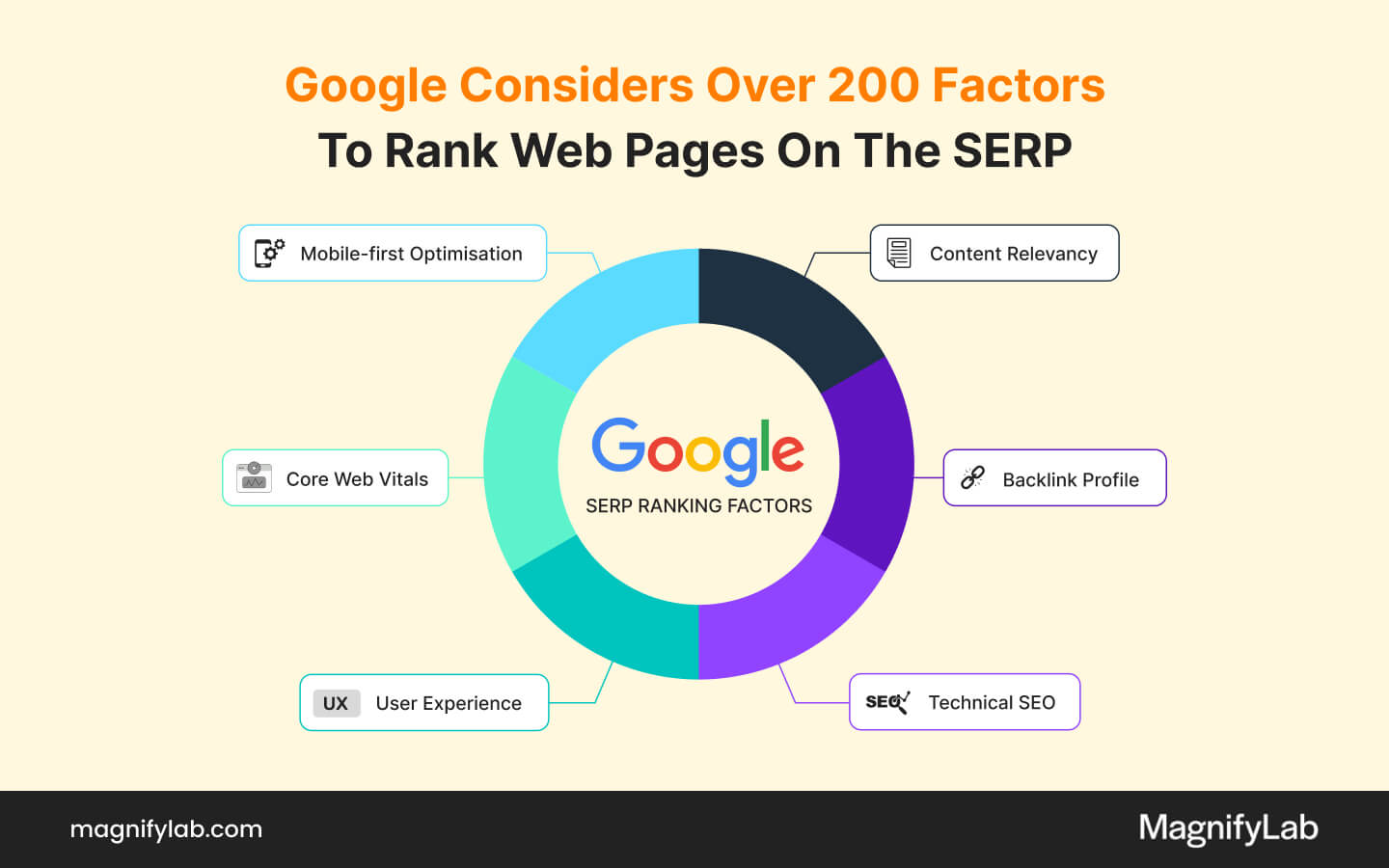
Google’s search engine is a marvel of modern technology, serving up millions of results in fractions of a second. But have you ever stopped to wonder how Google decides which web pages to display first?
The process is both complex and fascinating, involving a combination of algorithms, machine learning models, and ranking signals designed to deliver the most relevant, reliable, and high-quality content to users. Here’s a deep dive into the elements that influence how Google ranks web pages.
Google relies on over 200 ranking factors when it comes down to ranking a web page, covering everything from domain age, site architecture, usability to website reputation, and HTML sitemap and everything in-between.
Some of the most critical ranking signals include:
- Relevance: How well the content of a webpage matches the searcher’s query. Google analyses the content of a page, evaluating factors like the use of keywords and topics covered.
- Quality of Content: Google prioritises high-quality, original content that provides genuine value to readers. It looks for comprehensive, well-researched, and well-written content.
- Page Experience: This includes usability factors like mobile-friendliness, loading speed, and safe-browsing—elements that contribute to a positive and secure user experience.
- User Engagement: Metrics such as click-through rate (CTR), bounce rate, and time spent on the page can indicate the page’s usefulness to visitors. Pages that are more ‘”sticky” can result in higher rankings on the SERP.
- Backlinks: Links from other reputable websites serve as endorsements, suggesting the linked-to content is a valuable source of information. These can range from editorial links, directory listings, guest posts and social media links.
Search engines by market share UK

In the UK’s search engine landscape of 2025, Google continues to dominate with an overwhelming market share of 92%, reaffirming its position as the go-to search engine for the vast majority of users.
Bing follows as a distant second, securing 5% of the market, while Yahoo and DuckDuckGo vie for the remaining space, holding 2% and 1% respectively.
This distribution underscores the enduring supremacy of Google, despite growing privacy concerns driving some users towards alternatives like DuckDuckGo.
Mastering Search Intent: The 3 Types of Google Searches for Solicitors
Understanding the types of searches that lead users to your law firms doorstep is crucial for crafting an effective SEO strategy.
At its core, search intent categorises the purpose behind a user’s query into three main types: informational, navigational, and transactional.
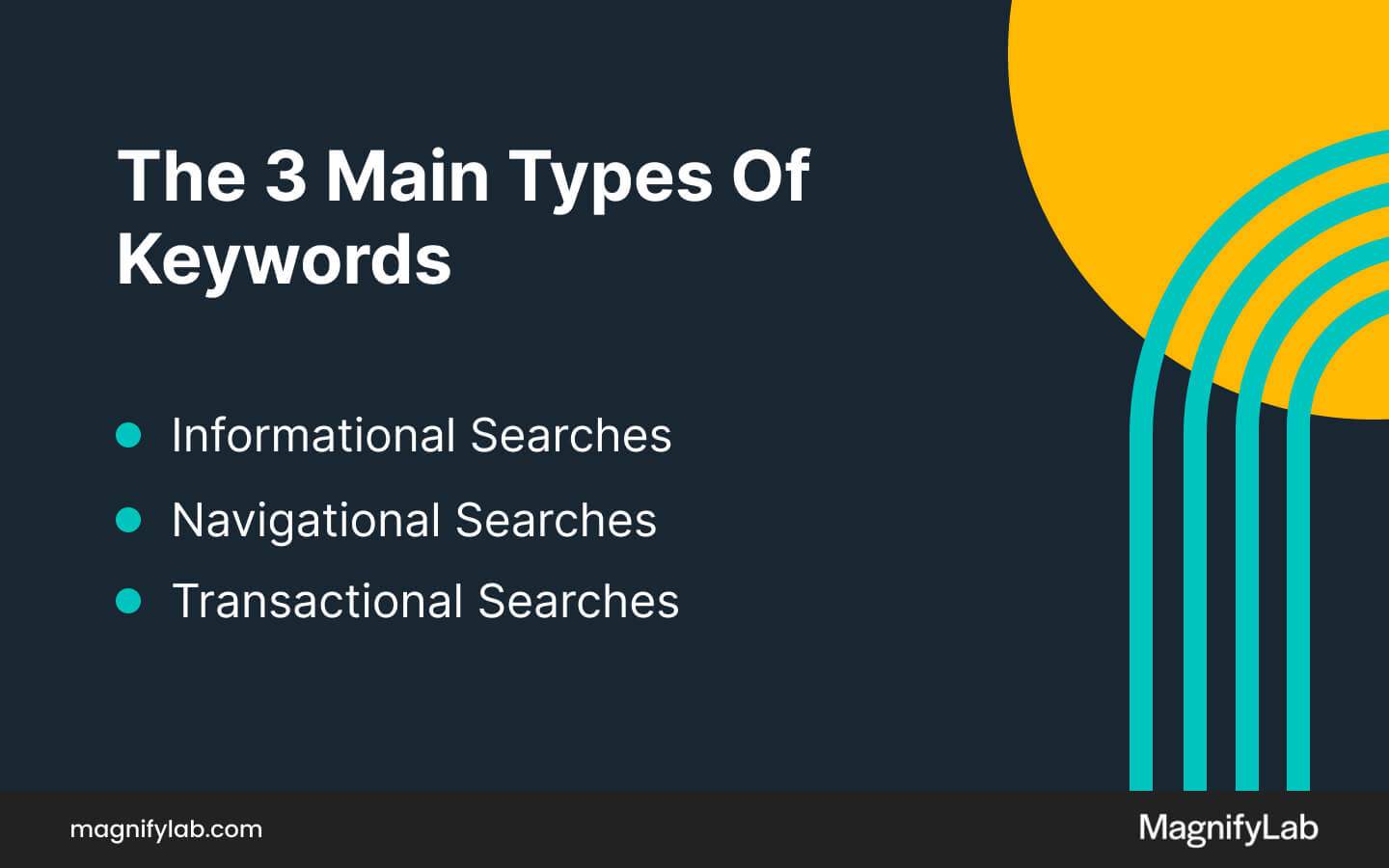
Each keyword type requires a unique approach to content creation and optimisation to ensure that your law firm’s website not only attracts visitors but also meets their needs and encourages engagement.
So, let’s dive into the different keyword types below!
1. Informational Searches
Informational searches are the quest for knowledge. Users embarking on these searches are typically in the early stages of their journey, armed with questions or seeking to understand a topic more deeply.
They’re not looking to buy – at least, not yet. Instead, they’re gathering information, which could range from “how much does a divorce cost?” to “what is a settlement agreement?”.
The key to capturing the attention of users conducting informational searches lies in providing comprehensive, authoritative content that answers their questions and enriches their understanding.
To excel in serving informational search intent, focus on creating detailed blog posts, how-to guides, FAQs, and informative videos. These pieces of content should not only answer the initial question but also provide additional value through related topics or insights.
For instance, an article addressing “how to get a divorce?” could assess the different avenues to obtaining a divorce in the UK and explore the benefits of hiring a divorce lawyer to protect the individual’s assets and secure the best outcome.
2. Navigational Searches
Navigational searches represent users with a destination in mind. They already know which website or specific page they want to visit; they just need Google’s help getting there.
Common navigational queries include “Vardags contact number” or “Slater & Gordon London“. Users performing navigational searches are not exploring their options – they want a direct route to their intended destination.
Optimising for navigational search intent involves ensuring your website and its pages are easily findable and accurately described in search results. This includes optimising your site’s meta tags and content with your brand name and relevant keywords.
Moreover, maintaining a clean, intuitive site structure helps search engines understand and index your site effectively, making it simpler for users to find you through navigational queries. Remember, the goal here is to minimise friction and get users to their desired destination as quickly as possible.
3. Transactional Searches
Transactional searches signal intent to take action. Users conducting these searches have moved beyond information gathering and decision-making – they’re in the prime frame of mind to engage with a law firm.
Example transactional queries like “personal injury solicitors London” or “criminal lawyers near me” exemplify transactional search intent. Here, the searcher has a clear goal and is looking for the right solicitor to fulfill their needs.
To capture and convert users with transactional intent, your content must be persuasive, highlighting the benefits and features of your service. Clear, compelling calls-to-action (CTAs) are vital, guiding users towards taking the next step.
Additionally, ensure that your website offers a seamless user experience, from landing page to enquiry submissions. Think about optimising your high traffic landing pages, including customer reviews and accreditations to portray trust, and offering easy navigation are all practices that support transactional search intent.
By understanding whether users are seeking information, trying to find a specific website, or ready to make a purchase, you can create targeted content that meets their needs and guides them through their journey – ultimately leading to higher traffic, better conversion rates, and increased customer satisfaction.
Local SEO for Legal Firms
Whether your law firm operates from a single location or has multiple offices throughout the UK, local SEO is more important than ever for businesses aiming to capture the attention of customers in their vicinity.
One crucial component of local SEO is the Google Map Pack, a feature that can significantly enhance visibility, drive traffic and generate leads to your doorstep.
But what exactly is the Google Map Pack, and how can you optimise your business to appear within this coveted space?
Understanding the Google Map Pack
Firstly, let’s dive into what the Google Map Pack entails. When you perform a search on Google, particularly one with local intent like “conveyancing solicitors near me” or “conveyancing lawyers in London” you’ll often see a boxed area at the top of the search results.
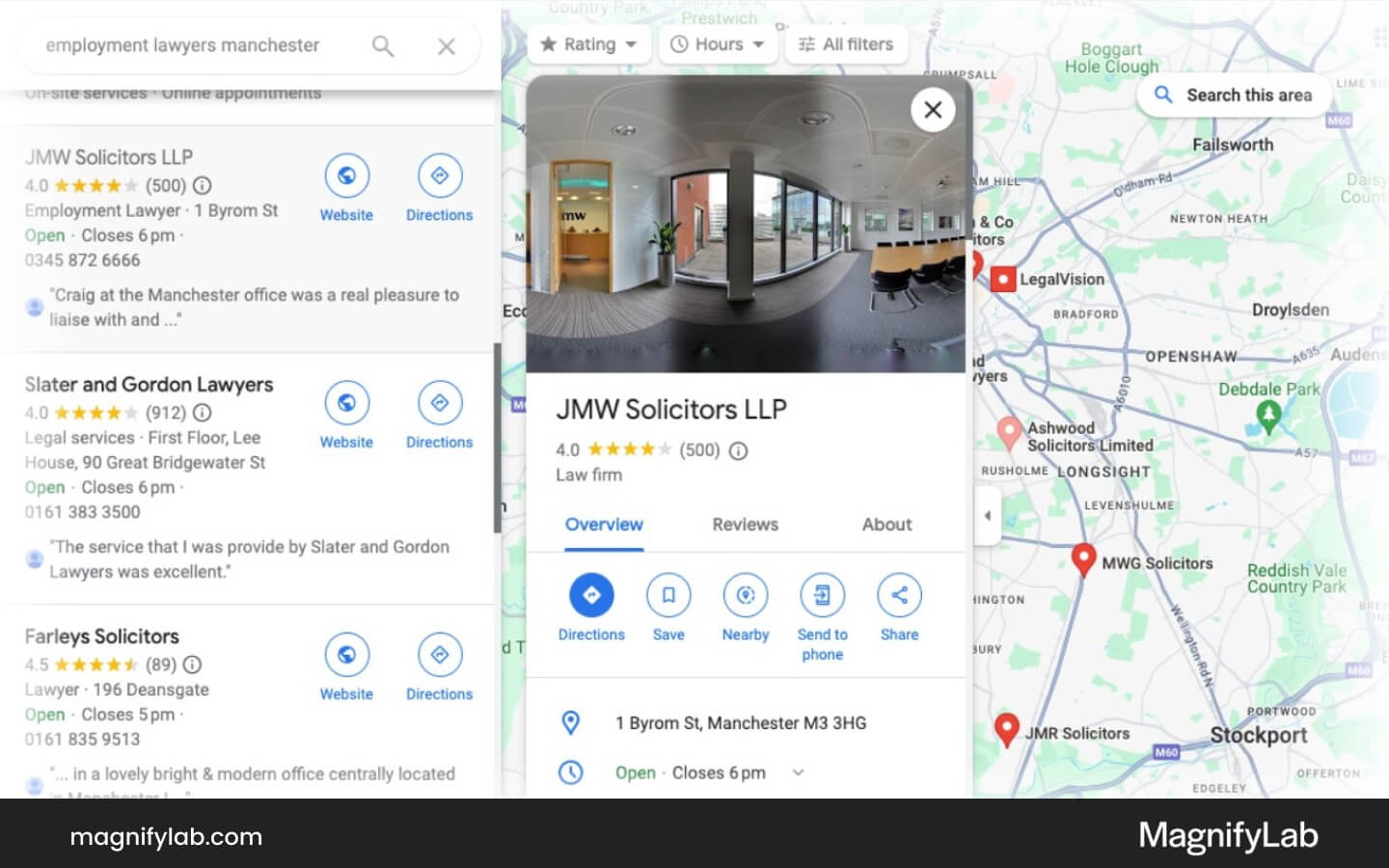
This is the Google Map Pack. It showcases a map followed by a list of three local businesses that match the search query.
Appearing in this pack is highly beneficial as it puts your law firm front and centre, increasing the likelihood of clicks, leads and new client instructions.
The Three Pillars of Google Map Pack Rankings
Google uses three main principles to determine which law firms appear in the Map Pack: relevance, distance, and prominence.
- Relevance: This measures how well your business matches the searcher’s query. Ensuring your Google Business Profile is detailed and accurate increases your chances of being considered relevant.
- Distance: As the name suggests, this factor considers how close your business is to the location term used in the search. If no location is specified, Google will use what it knows about the user’s location to find the closest relevant businesses.
- Prominence: This is about how well-known your business is, both online and offline. Google assesses this through factors such as the number of customer reviews, score ratings, and SEO practices across the web.
Strategies to Optimise for Google Map Pack
Now, let’s discuss strategies to enhance your law firms chances of appearing in the Google Map Pack:
- Optimise Your Google Business Profile(s): This is your foundation. Make sure your profile is complete, accurate, and updated. Include your business name, address, phone number, website, operation hours, and categories. High-quality, relevant photos can also make your listing more appealing.
- Local Citation and Directories: Beyond Google, ensure your business is listed on other local citation sites and directories such as Yelp, Bing Places, Yell, and local chambers of commerce websites. Consistency in your business name, address, and phone number (NAP) information across these listings is crucial.
- Encourage Reviews: Customer reviews are a key factor in local SEO and can significantly impact your prominence in search results. Encourage clients to leave positive reviews on your Google Business Profile and respond professionally to all reviews, whether positive or negative.
- Use Local Keywords: Incorporate location-based keywords into your website and content. This includes the county, city or town where your law firm operates, which helps Google understand where your business is relevant.
- Mobile Optimisation: With the increasing prevalence of mobile searches, ensure your website is mobile-friendly. A seamless mobile experience can influence your overall SEO performance, including your visibility in the Map Pack.
On-Page SEO Strategies for Law Firms
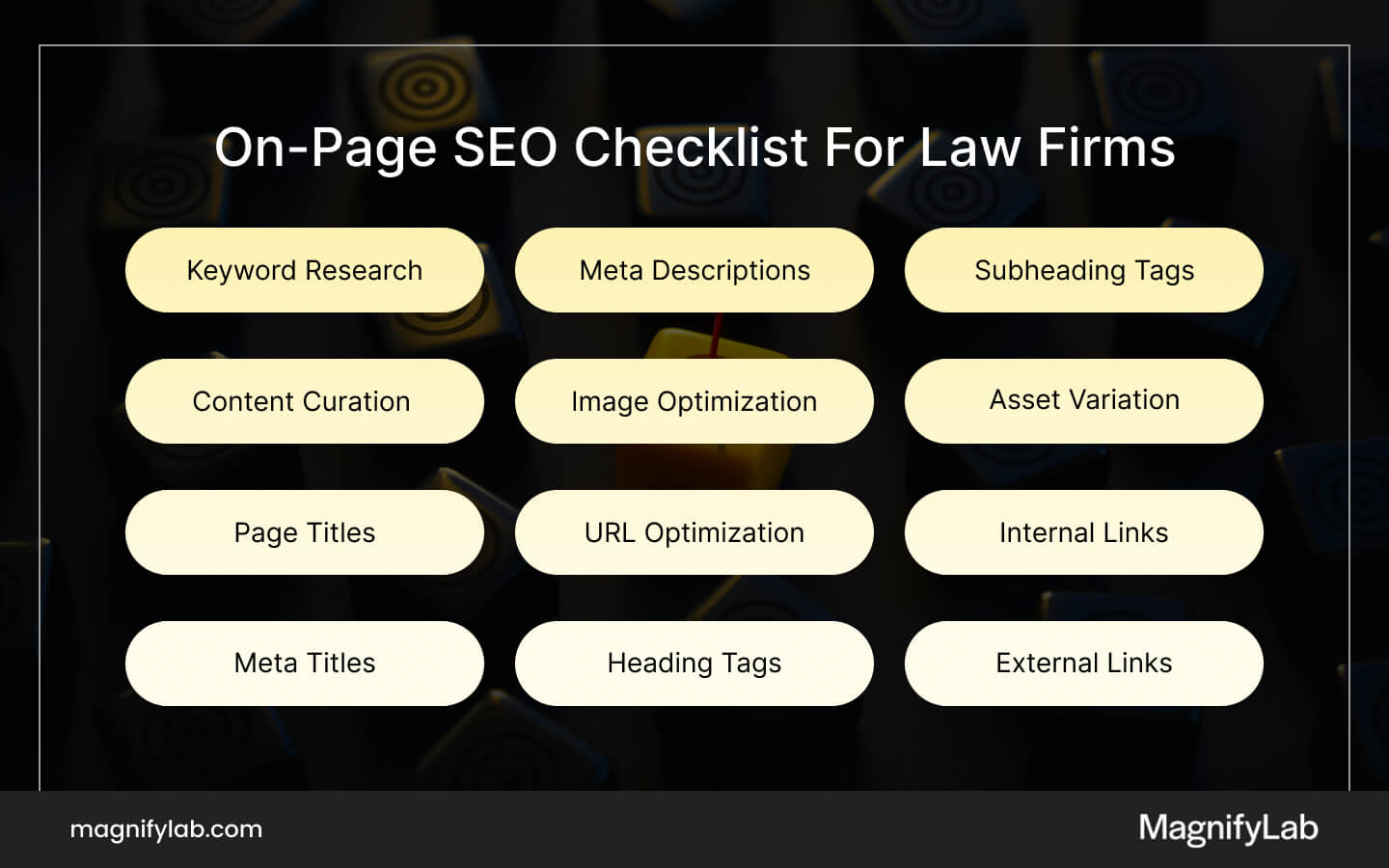
In the digital age, where the first interaction between a law firm and a potential client often begins with a search engine query, the importance of on-page SEO cannot be overstated.
For law firms, a robust on-page SEO strategy is not just about gaining visibility on search engine results pages (SERPs); it’s about establishing credibility, authority, and trust with prospective clients.
Here, we dive into the essential on-page SEO strategies tailored for law firms, aimed at enhancing their online presence and attracting more qualified leads.
Understanding On-Page SEO for Lawyers
On-page SEO refers to the practice of optimising individual web pages in order to rank higher and earn more relevant traffic in search engines.
It involves both the content and the HTML source code of a page that can be optimised, as opposed to off-page SEO which refers to links and other external signals.
6 key On-Page Lawyer SEO Strategies
-
Title Tags and Meta Descriptions
The title tag and meta description are crucial elements of on-page SEO. They not only tell search engines what your page is about but also serve as the first impression for users.
For law firms, it’s important to include relevant keywords, practice areas, and geographic locations in these tags to improve visibility and click-through rates (CTR). For blog posts, aim to include “power words” or “numbers”, both of which can help to boost your CTR.
-
High-Quality, Relevant Content
Content is the cornerstone of any effective legal SEO strategy. For law firms, producing high-quality, authoritative content that addresses the needs and questions of your target audience cannot be underestimated..
Aim to cover content across the funnel for each practice area. At the top of the funnel, the goal is to capture interest through informational content. Heading towards the bottom of the funnel, comprehensive “service page” content that covers your target keywords.
This could include blog posts on legal advice, case studies, or explanations of legal processes. Ensuring the content is optimised for relevant keywords and the user experience without sacrificing readability is essential.
-
Image Optimisation
One often overlooked but crucial aspect of on-page law firm SEO is image optimization. This strategy involves more than just selecting high-quality visuals; it’s about ensuring that each image is properly sized, labeled, and formatted to improve page load times and enhance user experience.
Image optimisation carries two benefits, being a) they help search engines understand and rank the content of images, and b) contributes to improved SEO outcomes, and they make images accessible to users who rely on screen readers, thus broadening a firm’s reach.
-
Structured Data Markup
Structured data markup, also known as schema markup, helps search engines understand the content on your website better.
For lawyers, using legal services schema can highlight important information such as areas of practice, reviews, and contact information in SERPs, making your listing more attractive to potential clients.
-
Improve Dwell Time
Dwell time is the measure of the duration a user spends on a webpage before returning to the search results page. This metric serves as an essential indicator of content relevance and user engagement, as it reflects how effectively a webpage meets the user’s needs.
In light of the recent Google document leak, dwell time has been highlighted as a potentially significant factor in search engine rankings.
A longer dwell time typically suggests that the content is helpful and engaging. For law firm SEO strategies, this means focusing on creating high-quality content that retains user interest, thereby increasing the likelihood of improved rankings.
-
Internal Linking Strategy
Internal linking helps to establish site architecture and spread link equity (ranking power) around websites.
Creating a logical hierarchy of pages and using relevant anchor text for internal links, that passes from one webpage to another, can help search engines and users navigate your website more effectively.
Implementing effective on-page SEO strategies is fundamental for law firms aiming to enhance their online presence and attract more clients via search engines. Remember, SEO is a long-term investment, and consistency is key to seeing sustained improvements in search engine rankings and online engagement.
Off-Page SEO Techniques for Solicitors
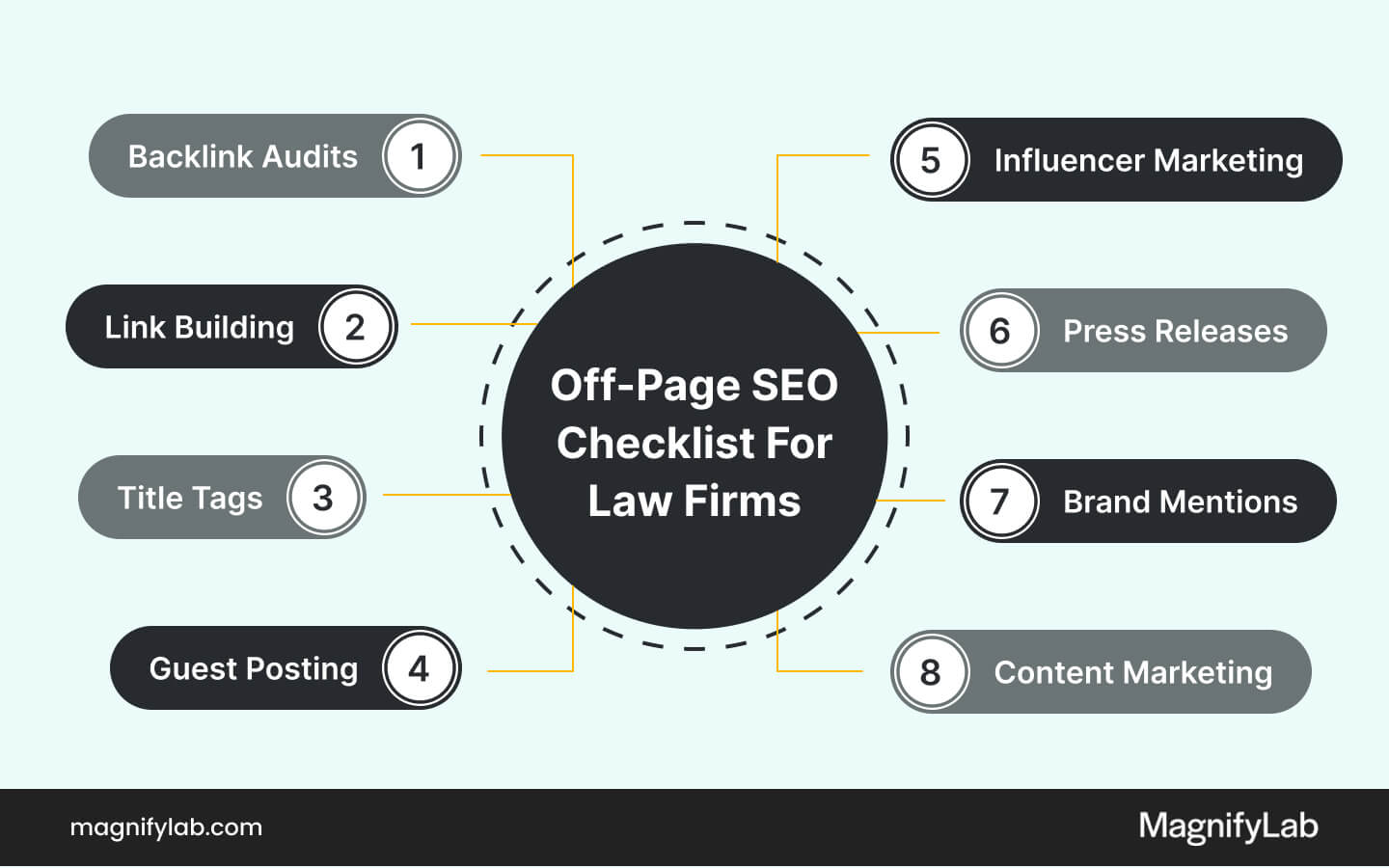
In the competitive landscape of legal services, establishing a robust online presence is indispensable for law firms aiming to attract and retain clients.
While on-page law firm SEO ensures that your website itself is optimised and content-rich, off-page SEO strategies extend your reach beyond your site, building the authority and trustworthiness that search engines favor.
This section of our “SEO marketing for law firms” blog dives into effective off-page SEO for legal firms techniques, focusing on the pivotal role of backlinks, their quality factors, and strategic link-building methods designed to enhance your law firm’s online stature.
What is a Backlink?
A backlink, essentially, is a digital referral or citation – a hyperlink from one website pointing to another. In the context of SEO, backlinks serve as endorsements of your content’s credibility and value.
For law firms, acquiring backlinks from authoritative sources is akin to receiving professional recommendations, signaling to search engines like Google that your law firm’s website is a reputable resource within the legal domain. This endorsement can significantly impact your search engine rankings, driving more organic traffic to your website.
Links Quality Factors
Not all backlinks are created equal. The quality of backlinks plays a critical role in determining their impact on your SEO efforts.
High-quality backlinks are characterised by several factors as detailed below:
- Popularity and Authority: Links from well-regarded, authoritative sites (such as leading legal publications or institutions such as the BBC or Sky News) carry more weight. However, such high profile links are difficult to obtain unless this is achieved through natural PR.
- Relevance: Links from sites related to the legal field or your specific area of practice are more beneficial, as they signal to search engines that your content is relevant to your industry. For instance, if your intention is to bolster organic positions for your immigration department, it would be beneficial to obtain links that are relevant to this niche.
- Trust: Trustworthiness of the linking site, as determined by its domain age, domain authority (DA), and absence of spammy content, enhances the value of a backlink.
- Anchor Text: The clickable text in a hyperlink should be relevant to the linked page’s content, providing clear context to both users and search engines.
Common Types of Backlinks To Strengthen Your Website Authority
Developing a strategic approach to link building can significantly boost your law firm’s off-page SEO.
Here are some of the types of backlinks that can you explore to boost your website’s authority and ranking potential:
- Guest Blogging: Collaborate with reputable legal blogs or industry publications to write guest articles. This not only positions you as a thought leader but also allows you to include backlinks to your website.
- Content Promotion: Create and promote engaging, informative content on your site, such as blog posts, case studies, or whitepapers. Use social media, email marketing, and partnerships with influencers to increase its visibility and encourage natural backlinking.
- Local Directories and Listings: Ensure your law firm is listed in local business directories and legal listings sites like Google My Business, Bing Places, and Yelp. These platforms often allow you to add a link to your website, alongside your law firms contact details (address + telephone numbers) improving local SEO and attracting potential backlinks.
- Partnerships and Collaborations: Engage in collaborations with other law firms, legal associations, or industry influencers on projects, webinars, or events. These partnerships can lead to reciprocal backlinking and enhanced visibility.
- Press Releases and Media Coverage: Leverage significant achievements, awards, or newsworthy events by publishing press releases. Media coverage can result in valuable backlinks from news outlets and industry blogs.
Implementing these off-page SEO techniques requires time, patience, and persistence. However, the payoff in terms of improved search engine rankings, increased website traffic, and higher client acquisition rates makes it a worthwhile investment for any law firm looking to thrive in the digital age.
Technical SEO Marketing For Law Firms
Technical SEO might sound daunting, especially for legal professionals who are experts in law, not coding. However, the rewards for getting it right are significant.
Improved search engine rankings lead to more website visits, which ultimately translate to more clients. Let’s dive into the meaning of technical SEO and the key factors that every law firm should prioritise.
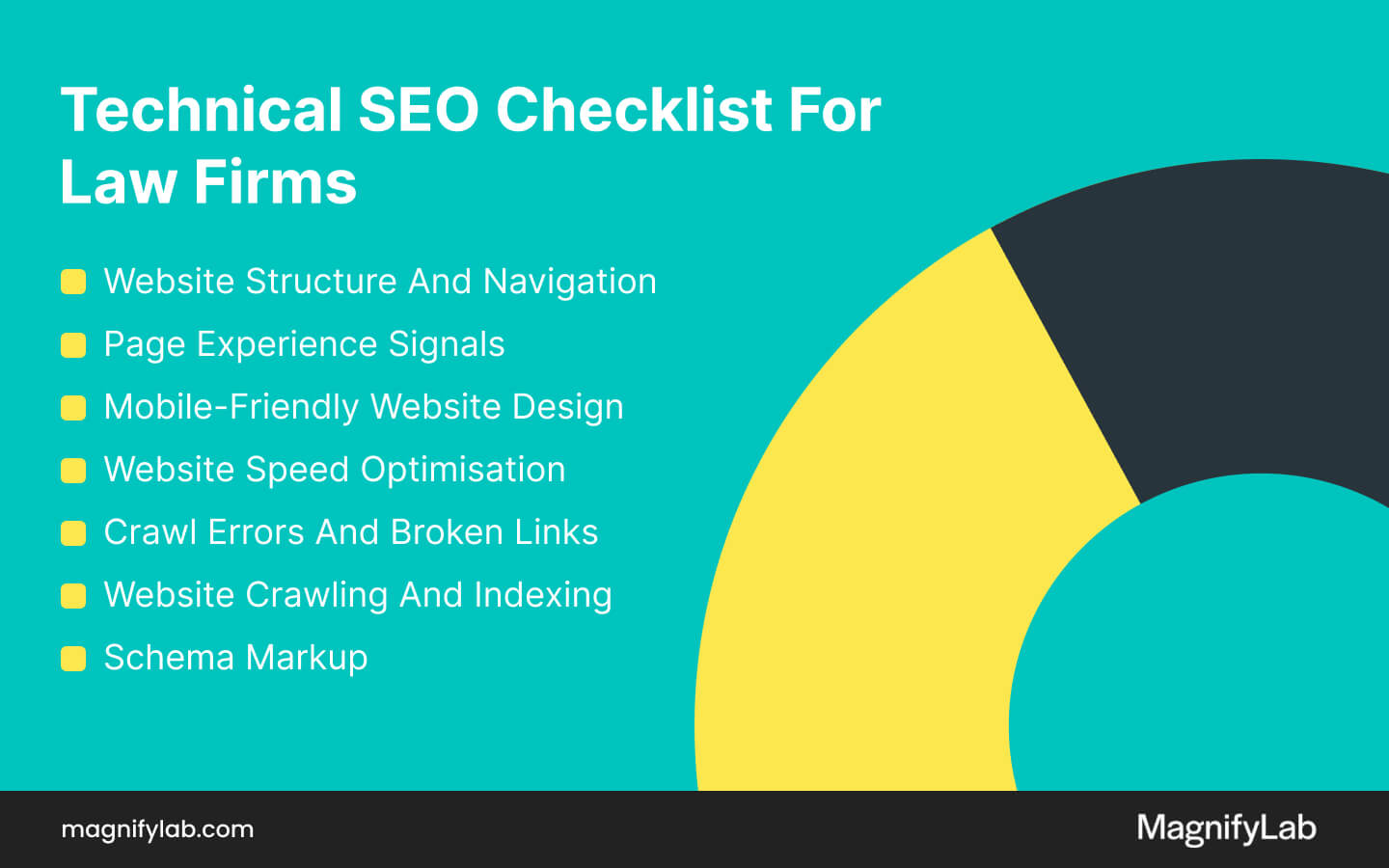
What is technical SEO?
Technical SEO refers to the process of optimizing your website’s infrastructure, making it easier for search engines to crawl and index your content. For law firms, this means ensuring your site is as accessible and understandable to search engines as it is to potential clients.
Understanding and implementing technical SEO can significantly improve your website’s visibility and ranking on search engine results pages (SERPs), ultimately driving more traffic to your site.
7 key Technical SEO Strategies for Law Firms
Now, let’s deep dive into the main factors of technical SEO that law firms need to consider.
-
Website Structure and Navigation
A well-structured website helps users and search engines find information quickly and easily. For law firms, this means having a clear, logical layout of services, solicitor bios, contact information, and resources like blogs or case studies.
Ensure your website has a logical hierarchy, with clear navigation and a sitemap that lists all your important pages. This makes it easier for search engines to crawl your site and for users to find the information they need.
Each practice area should have its own page to improve relevance and rankings for specific legal queries. A clean, intuitive navigation setup ensures that both potential clients and search engine crawlers can move through your site without getting lost, reducing bounce rates and improving overall engagement.
-
Page Experience Signals
Google’s Page Experience update has made the user experience (UX) a ranking factor. This includes everything from how quickly your pages load to how mobile-friendly your site is.
Part of Google’s Page Experience signals, Core Web Vitals are metrics that measure the speed and stability of your pages.
They include Largest Contentful Paint (LCP), which measures loading performance; First Input Delay (FID), which measures interactivity; and Cumulative Layout Shift (CLS), which measures visual stability.
Law firms should aim for an LCP of 2.5 seconds or faster, an FID of 100 milliseconds or less, and a CLS score of 0.1 or less. Improving these metrics can significantly boost your law firm website’s user experience and keyword rankings.
-
Mobile-Friendly Website Design
With the increasing use of mobile devices to access the internet, having a mobile-friendly website is no longer optional.
Google’s mobile-first indexing means that Google predominantly uses the mobile version of the content for indexing and ranking. A responsive design ensures that your site looks and performs well on all devices, improving user experience and SEO.
-
Website Speed Optimisation
Site speed is a known ranking factor for Google. Websites that load quickly provide a better user experience, reducing bounce rates and potentially increasing engagement and conversions.
On the flip side, slow-loading pages can lead to higher bounce rates, negatively affecting both the user’s experience and your SEO performance.
Law firms should optimize their website’s loading times by compressing images, minimizing code, leveraging browser caching, and using a content delivery network (CDN) if necessary.
-
Website Indexing
Ensuring your legal website’s pages are correctly indexed by search engines is fundamental to being found online. Use the URL Inspection tool in Google Search Console to check if your pages are indexed.
If important content isn’t appearing in search results, it won’t bring in traffic, no matter how well-written or relevant it is.
-
Crawl Errors and Broken Links
Search engines use bots to crawl your website’s content, but crawl errors can prevent them from accessing certain pages.
Similarly, broken links on your site can frustrate users and lead search engine bots to dead ends, negatively impacting your site’s health and rankings.
Regularly audit your website for crawl errors and broken links using tools like Google Search Console and SEMrush. Fixing these issues ensures that search engines can index your content efficiently, users can navigate your site effectively, and your website has the highest possible health score.
-
Schema Markup
Schema markup is a form of microdata that helps search engines understand the context of your content.
For law firms, implementing schema markup can enhance your visibility in SERPs through rich snippets, which can include reviews, FAQs, or your firm’s contact information, making your listing more appealing to potential clients.
Assessing the Effectiveness of SEO for Solicitors
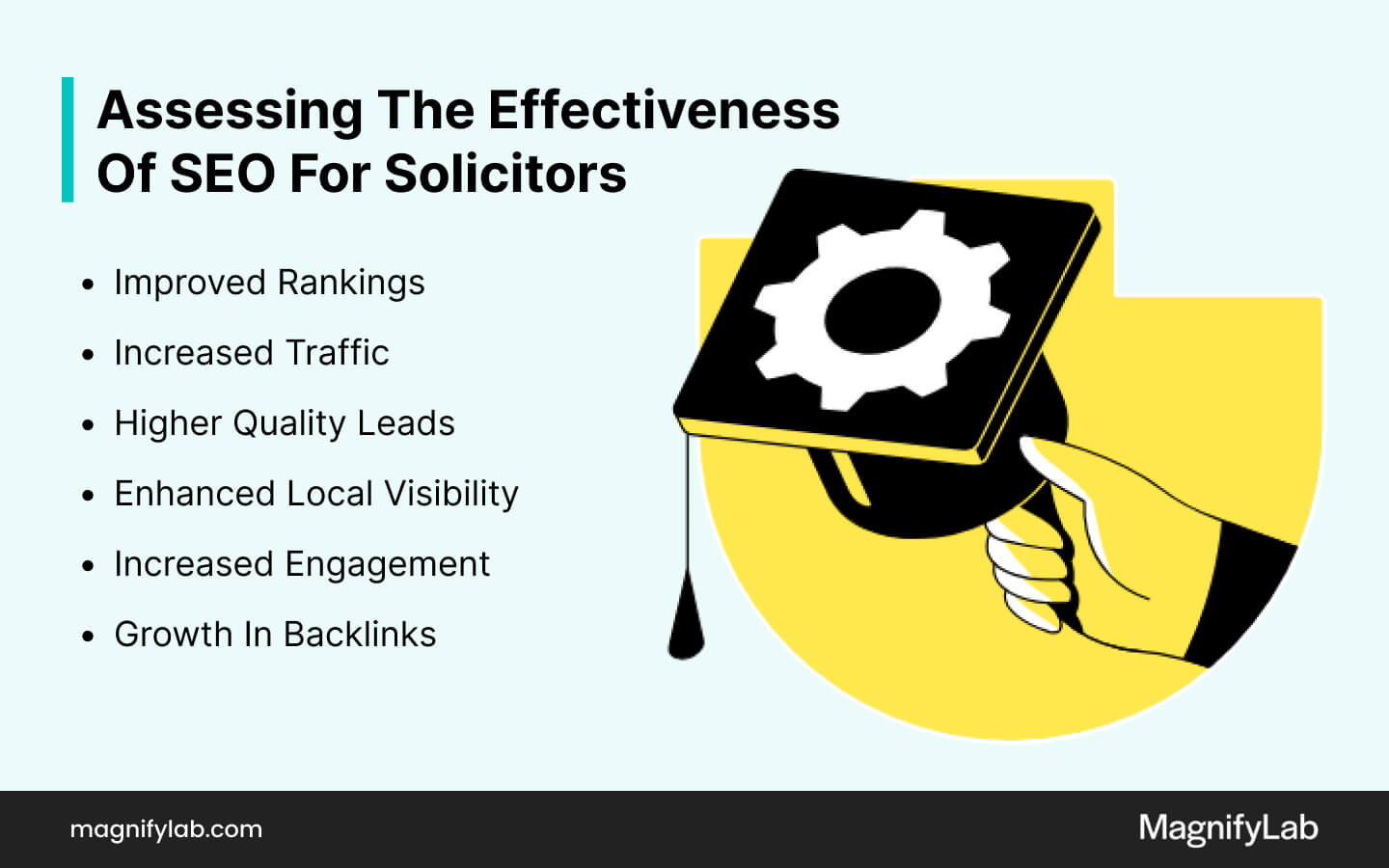
For law firms, investing in Search Engine Optimisation (SEO) is essential to increase visibility, drive traffic to their website, and ultimately secure more clients. Whether you’re focusing on personal injury SEO, family law SEO, or employment law SEO, organic search is absolutely fundamental to maximise your growth objectives.
However, knowing whether your SEO efforts are paying off can be challenging without understanding what metrics to monitor.
Here’s a detailed breakdown of how lawyers can gauge the success of their SEO strategies.
-
Improved Rankings:
One of the most direct indicators of successful law firm SEO is an improvement in keyword rankings for targeted keywords.
Law firms should identify a list of relevant keywords that potential clients might use to find their services, such as “personal injury lawyer” or “best divorce lawyer near me.”
-
Increased Organic Traffic:
An increase in organic traffic shows that more people are finding your law firm through search engines. This is always a good barometer to go by to measure progress with any law firm SEO strategy.
Use tools like Google Analytics 4 (GA4) and Google Search Console to track and measure your law firm’s website traffic and focus on the ‘Organic Search’ channel.
-
Higher Quality Leads:
SEO isn’t just about attracting more visitors; it’s about attracting the right visitors. Effective legal SEO strategies should bring in more qualified leads interested in your legal services.
Ensure you have accurate conversion tracking on the backend to measure the number of form submissions and phone calls coming through the website. You’ll then be able to track the number of leads generated and get a handle as to whether these are converting into new clients.
-
Enhanced Local Visibility:
Local SEO is a crucial strategy for most law firms, regardless of size.. Being visible in local search results, especially in the Google Map Pack, can significantly impact your law firm’s visibility to potential clients in your locations of interest.
Monitor your presence in local search results and track changes in your local rankings. Tools like Moz Local or BrightLocal can help you manage your local SEO performance and provide insights into how your law firm compares to competitors with regards to local search rankings.
-
Increased Engagement Metrics:
Engagement metrics such as bounce rate, pages per session, and average session duration offer insights into how visitors interact with your website.
A lower engagement rate or session duration indicates that visitors aren’t finding your website useful and some form of website optimisations are in order. A poor quality user experience is also likely to peg back your SEO efforts as this is an important factor in Google’s ranking algorithm.
-
Growth in Backlinks:
Backlinks, or inbound links from other websites, are a vital component of SEO. They signal to search engines that other sites consider your content credible and authoritative.
By reaching a position where your website generates a healthy volume of traffic, it’s likely third-parties will start naturally linking to your content.
Whilst this is generally a positive sign, it’s also prudent to closely monitor your backlinks to assess quality and disavow any links that may be viewed as being detrimental to your law firm.
Evaluating the success of SEO for law firms involves a multifaceted approach. By monitoring improvements in search engine rankings, organic traffic, lead quality, local visibility, engagement metrics, and backlinks, lawyers can get a comprehensive view of their SEO performance.
Remember, SEO is a long-term strategy. Regular analysis and adjustments based on these metrics will ensure your law firm continues to improve its online presence, generate more inbound leads, and attract more potential clients.
How to Optimise a Law Firm Website for SEO
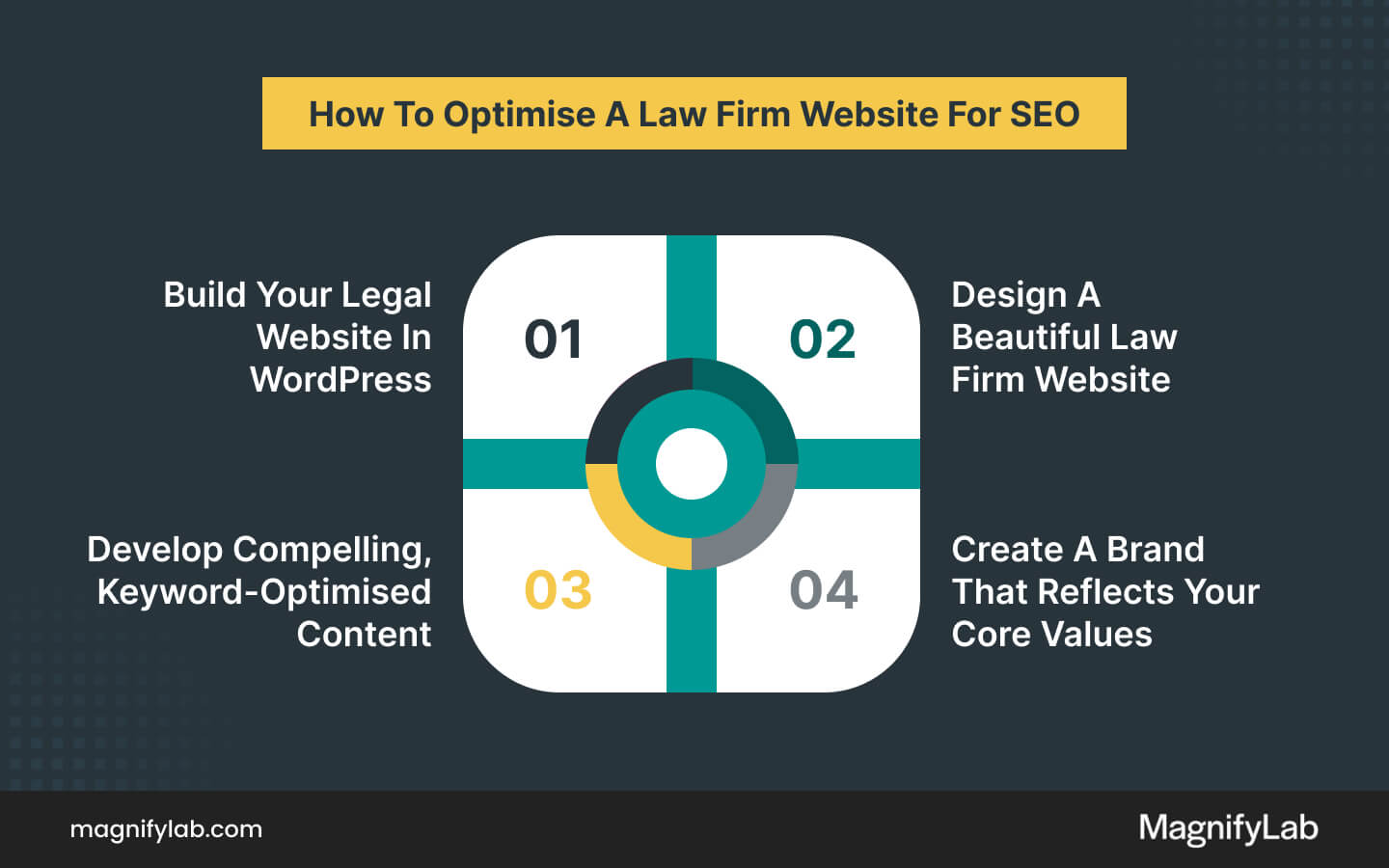
In the digital age, having a robust online presence is crucial for law firms aiming to attract more clients and establish their authority in the legal industry. Search Engine Optimization (SEO) plays a pivotal role in enhancing your visibility on search engines like Google.
However, optimising a law firm website requires a strategic approach that combines technical prowess with creative flair. Here are 3 steps to help you achieve that:
-
Build Your Legal Website in WordPress
The foundation of any SEO strategy starts with the right platform, and WordPress stands out as our recommended content management platforms (CMS) for law firms.
Renowned for its flexibility and user-friendliness, WordPress not only makes it easy to manage your content but also comes packed with SEO-friendly features.
Its vast collection of plugins and themes allows you to tailor your site to your specific needs, ensuring that it’s optimized for search engines right out of the gate. By choosing WordPress, you’re setting your law firm up for SEO success, providing a solid base to build upon.
-
Design a Beautiful Law Firm Website
First impressions matter, and in the world of legal services, a well-designed law firm website speaks volumes about your brand, values and credibility.
A beautiful, clean design not only captures the attention of potential clients but also enhances user experience, which is a critical factor with both SEO rankings and lead generation.
To help give you inspiration, we’ve put together our pick of the best law firm website designs.
To make your legal website stand out, focus on:
- Mobile-Friendliness: Ensure your website looks great and functions perfectly across all devices. With the majority of searches now performed on mobile, a responsive design is non-negotiable.
- Speed Matters: Page load times significantly affect your bounce rates and SEO rankings. Optimise images and leverage website caching to keep your site speedy.
- Navigation: A simple, intuitive navigation system helps users and search engines find information quickly, improving your site’s usability and SEO.
-
Develop Compelling, Keyword-Optimised Content
Content is king in the realm of SEO, and for law firms, this means creating high quality content that’s both informative and engaging.
But it’s not just about what you say – it’s also about how you say it.
Here are some guidelines to ensure your content hits the mark:
- Originality: Duplicate content can penalise your SEO efforts. Always strive for unique content that provides value to your target audience.
- Relevance: Focus on topics that resonate with your target audience. Address common legal matters and offer insights that position your firm as an authority.
- Keyword Optimisation: Through careful keyword research, identify terms your potential clients are searching for. Integrate these keywords naturally into your content to improve visibility.
-
Create a Brand That Reflects Your Core Values
Your law firm branding is more than just a logo or color scheme; it’s the embodiment of your law firm’s values and mission.
A strong brand identity fosters trust and distinguishes you from competitors. Consider these aspects when crafting your brand:
- Logo and Design: Your logo should be memorable and reflective of your firm’s ethos. Choose design elements that convey professionalism and reliability.
- Consistency: Ensure your branding is consistent across all platforms, from your website to social media and beyond. This reinforces your identity and aids in brand recognition.
- Communication: Clearly articulate your firm’s values and mission. Let potential clients know what sets you apart and why they should choose you over others.
By meticulously applying these strategies, you can significantly enhance your law firm’s online presence and SEO rankings.
Remember, SEO is a marathon, not a sprint. Consistent effort and adaptation to evolving SEO practices will ensure your law firm remains visible and competitive in the digital landscape.
The best Law Firm SEO tools to implement in 2025
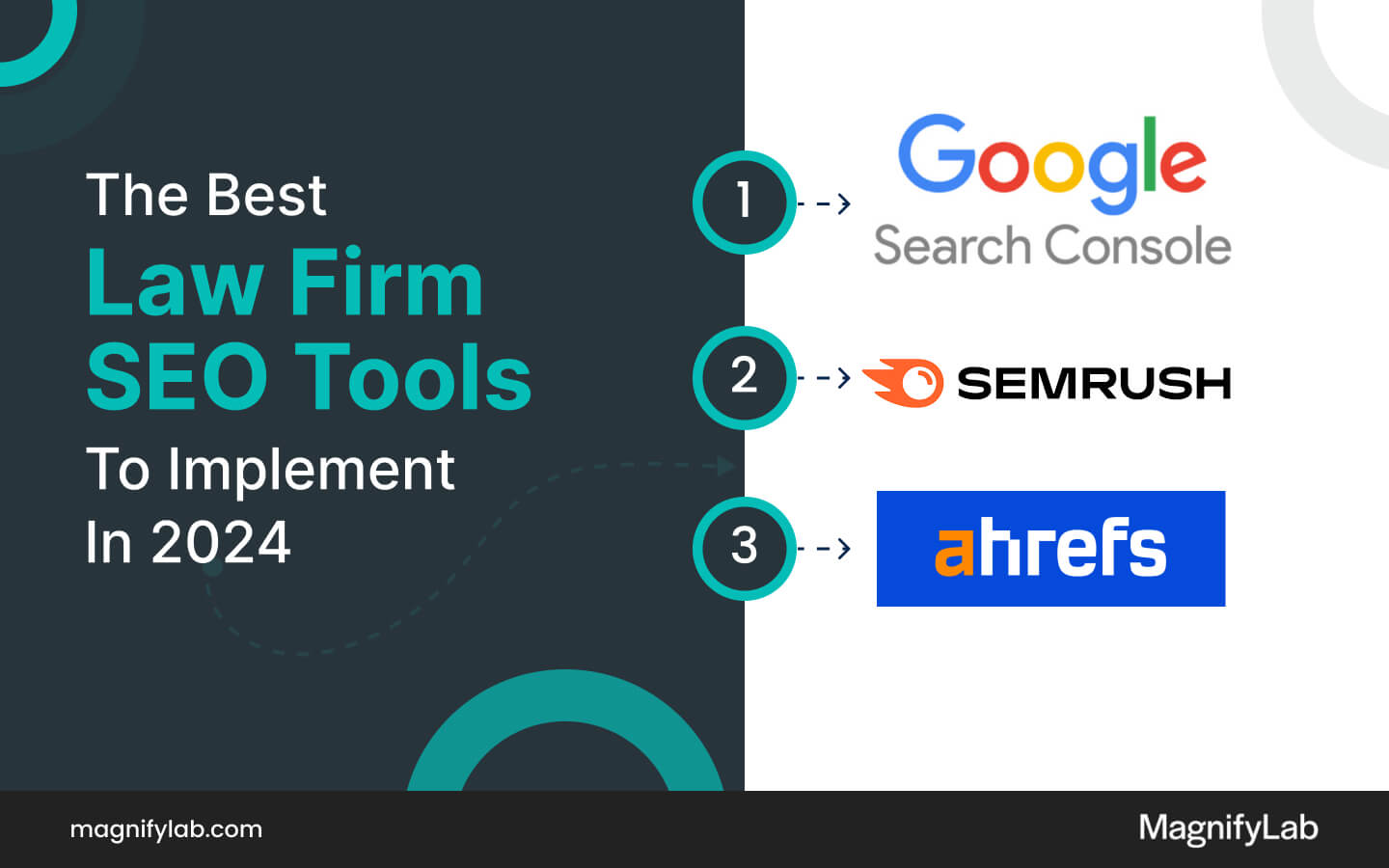
As the digital landscape continues to evolve at a breakneck pace, staying on top of the SEO game has become more crucial than ever.
In 2025, law firms and solicitors are vying not just for visibility but for relevance and authority in an overcrowded online world. To navigate this complex terrain, leveraging the best SEO tools is non-negotiable.
These tools do not merely streamline the optimisation process; they unlock deep insights into search trends, competitor strategies, and the ever-changing algorithms of search engines. Armed with the right tools, law firms can sharpen their SEO strategies, ensuring they not only keep up with but outpace the competition.
Choosing the right SEO tools can transform your approach from guesswork to precision. Three tools stand out for their comprehensive features, user-friendly interfaces, and powerful analytics capabilities as detailed below:
-
Google Search Console
Google Search Console is an essential tool for any SEO toolkit, offering unmatched insights directly from the search engine giant itself.
It provides detailed reports on your website’s visibility on Google, including which queries bring users to your site, how high your pages rank in search results, and how effectively Google can crawl and index your content.
This free tool is invaluable for diagnosing website issues, monitoring backlinks, and understanding your site’s performance in organic search. By leveraging the data from Google Search Console, businesses can identify areas for improvement, track their progress over time, and refine their SEO strategies to better meet the needs of their target audience.
-
SEMRush
SEMRush stands out for its all-in-one functionality, catering to various aspects of digital marketing beyond just SEO.
It’s particularly useful for businesses looking to conduct competitive research, offering detailed insights into competitors’ strategies, from the keywords they’re targeting to the ads they’re running.
With SEMRush, law firms can also perform comprehensive site audits, track their SERP positions, and discover new opportunities for backlinks. Its keyword research tool is among the best, helping users find lucrative keywords and understand search intent.
By integrating SEMRush into your law firm SEO strategy, you gain access to a wealth of data that can inform every decision, from content creation to marketing campaigns.
-
Ahrefs
Ahrefs is renowned for its robust backlink analysis capabilities, making it a favourite among SEO professionals.
Beyond backlinks, Ahrefs offers a suite of tools that cover every aspect of SEO, from keyword research to competitor analysis, content exploration, and rank tracking.
Its intuitive interface and comprehensive data visualisations help demystify complex SEO data, making it easier for businesses to identify opportunities for growth and tackle challenges head-on.
Whether you’re looking to uncover new keywords, analyse your competitors’ strategies, or monitor your website’s ranking for critical search terms, AHRefs provides the insights you need to craft a winning SEO strategy.
Passing thoughts on SEO for lawyers
In the competitive field of SEO for solicitors, having a strong online presence is non-negotiable. This lawyer SEO guide underscores the need for a tailored SEO strategy for UK law firms to drive growth.
By focusing on key areas such as technical SEO, content creation, link building, and leveraging the power of SEO tools, law firms can carve out a significant niche for themselves in the digital landscape.
Becoming good at SEO for law firms takes time and effort, it’s not something you can do once and forget about. Law firms must update their SEO strategies to remain visible and attractive to their target audience.
This is necessary because the digital landscape is constantly evolving. By staying current with SEO tactics, solicitors can ensure they are reaching their desired audience effectively. This will help them stay competitive in the online market.
Contact our specialist law firm marketing agency today to improve your existing SEO strategy or create a new one. We can also support you with PPC advertising for lawyers and website development, providing a full-service solution to acheive your marketing goals.
Our creative team has the experience, resources, and industry knowledge to increase your law firm’s online visibility. For your free SEO for solicitors strategy session, simply call 020 7207 2755 or complete the website enquiry form.

